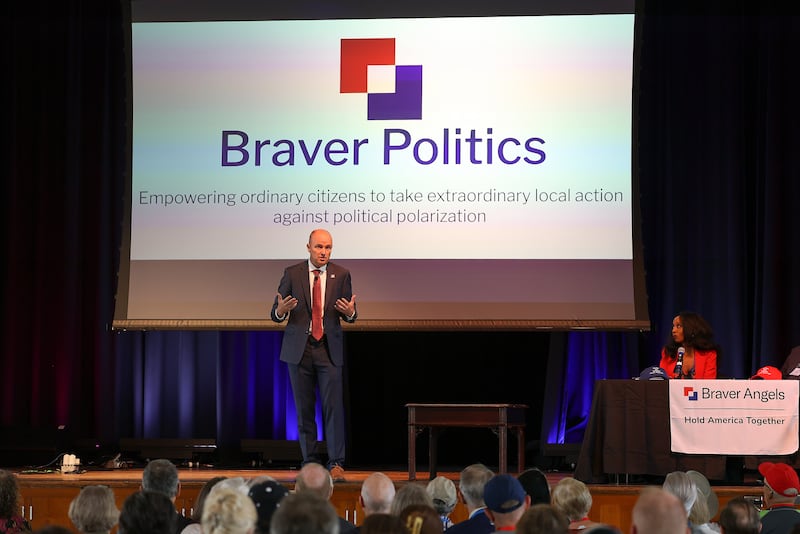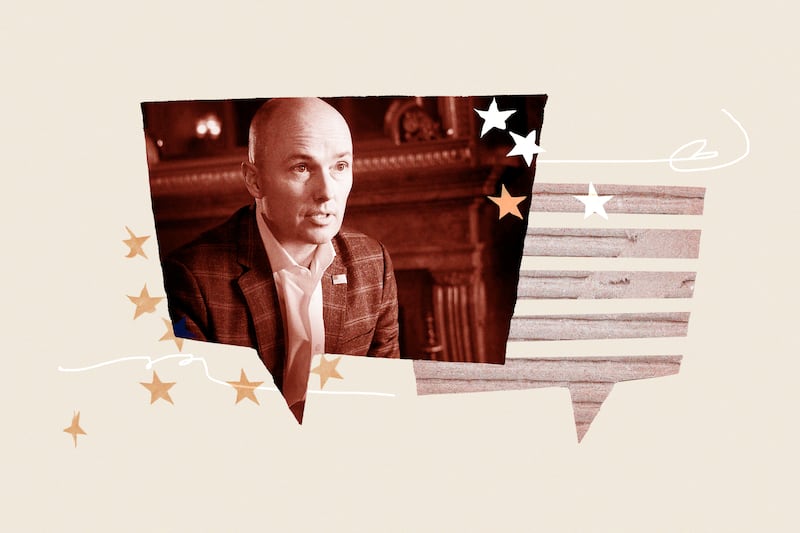On the day after the Fourth of July, with random bits of debris from nighttime fireworks celebrating the nation’s independence still evident in Utah’s neighborhoods, the governor of this fine Western state was in his office at the Capitol discussing an upcoming speech and an audacious goal.
“I’m not going to call it an address. It’s a speech,” he joked, about his appearance the next Saturday at Gettysburg, the historic site of one of the nation’s most important military battles, and later a beloved speech to consecrate hallowed ground. Abraham Lincoln’s Gettysburg Address provided a framework of respect, dedicating the place where more than 50,000 gave their lives, and reminding all Americans that the nation was “conceived in liberty”, and asking for greater devotion to the cause of freedom.
And he did it in about 2 minutes.
The governor said then that his remarks weren’t quite finished. But he had the concept: to preserve our humanity and solve the problems ahead, we have to learn to disagree better.
“You never convince anyone by attacking them. You actually convince them by trying to bring them along,” he said, as we discussed the polarization of the country, the bitterness between some Republicans and Democrats, and his desire to do something about it.
“This is not a civility initiative. This is not that we just have to be nice to each other. This is about conflict, and healthy conflict.”
That is a remarkable task to undertake, but after the governor’s VERY big week, there is growing evidence that the nation takes Utah seriously and the governor’s initiative is off to a good start. Put another way, ask the governor what he did on his summer vacation and the response, at least to this point, is clear: “What vacation?”

Consider:
On Saturday, July 8, Cox completed his speech at Gettysburg, speaking to the Braver Angels, a group dedicated to bridging political divides. His message there, as described in the Deseret News: “The alternative of continuing down our current path is unthinkable. But perhaps not — because we’re here on the site where the unthinkable actually happened.” He continued: “We can never solve any of the other challenges … if we hate each other and continue to fill state houses and halls of Congress with performers and people who destroy institutions.”
On Sunday, July 9, He went on CBS national broadcast “Face the Nation” and described what he and Utah’s legislators are doing to protect children from the destructive influences of social media. “In the coming months, you will see lawsuits being filed by the state of Utah to hold (companies) accountable,” Cox said.
On Tuesday, July 11, Jane Coaston of the New York Times began a new Question and Answer feature described as “the first in a series ... exploring modern conservatism today.” First up was Utah Gov. Spencer Cox. The headline there: “The Republican Governor of Utah Wants to Spare Kids From Their Phones.” The dangers of social media were explored in a lengthy interview.
On Thursday, July 13, the editorial board of the Washington Post detailed his efforts of disagreeing better, noted his new leadership position with the National Governors Association, and ended its editorial with this note of support: “Mr. Cox is brave to try — and for believing that Americans are not living in a “post-kindness” world.”
On Friday, July 14, the nation’s governors turned their attention to Cox as he became chairman of the National Governors Association and formally detailed his Disagree Better initiative. A YouTube video of Cox and Colorado Gov. Jared Polis, a Democrat, reflecting on how to disagree better, was released. Utah and Colorado are different states with different vibes — red and blue — and certainly different priorities. But there are areas of agreement, and there are shared problems (water, growth, etc.). So Cox and Polis are modeling problem-solving from a position of mutual respect.
So what’s next for Utah, Cox and the nation?
Summer celebrations will continue. Cox said he will be riding in Salt Lake’s Pioneer Day parade on July 24th. Governors usually ride comfortably in a convertible, but Cox will be on horseback, reflective of his rural Utah roots in Fairview.
Then it’s on to the work of disagreeing better. He’ll practice this initiative by taking on the issue of immigration. It’s baffled Republicans and Democrats for decades, each taking their turn failing to bring consensus on protecting the border, while being welcoming to immigrants. Cox is confident there is a solution out there, if we can learn to rise above hate.
In September, he’ll share the stage at the Atlantic Festival in Washington, D.C. (Sept. 28-29) in an on-stage interview with journalist McKay Coppins. Arthur Brooks, Nancy Pelosi, Kerry Washington and others are featured in the two-day event billed as a chance to bring together “influential and provocative political, cultural, business, tech, and climate leaders.”
There is interest in what Cox — and Utah — have to say and have to offer.
I wonder what will happen this week?
Note: Doug Wilks is the executive editor of the Deseret News.


